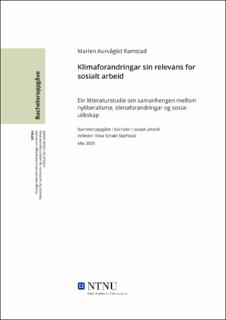| dc.contributor.advisor | Skjefstad, Nina Schiøll | |
| dc.contributor.author | Ramstad, Marlen Aurvåglid | |
| dc.date.accessioned | 2021-09-28T18:44:18Z | |
| dc.date.available | 2021-09-28T18:44:18Z | |
| dc.date.issued | 2020 | |
| dc.identifier | no.ntnu:inspera:56776074:6060662 | |
| dc.identifier.uri | https://hdl.handle.net/11250/2785639 | |
| dc.description.abstract | Vi står overfor vår tids største utfordring knytt til klimaforandringar og samfunnsutfordringane det fordrar. Etter tre år på NTNU og Institutt for sosialt arbeid, har klimautfordringane nesten ikkje blitt nemnt. Dette verkar rart ettersom sosialt arbeid er ein menneskerettsprofesjon, og det globale samfunnet står overfor ei utfordring som truar levegrunnlaget til heile menneskeheita. Eg ønska å finne ut om det fanst noko forsking og praksisar innanfor sosialt arbeid knytt opp mot til desse utfordringane, samtidig som eg ville sjå djupare på prosessane som ligg bak den situasjonen vi no er i. For å sjå på desse spørsmåla, har eg formulert følgande problemstilling: Korleis heng nyliberalisme, klimaforandringar og sosial ulikskap saman? - Og korleis kan sosialarbeidarar betre imøtekome dei sosiale behova klimaforandringar skaper ved å ta inn prinsipp frå grønt sosialt arbeid?
Denne oppgåva er ein litteraturstudie som undersøker samanhengen mellom nyliberalisme, klimaforandringar og sosial ulikskap. Nyliberalismen har gjort at solidaritet og fellesskap er erstatta med konkurranse og individualisme, som fører auka sosial ulikskap på bakgrunn av individualisering av sosiale problem og ein svakare velferdsstat. Nyliberalismens tankesett og økonomiske system fremmar ein marknadsideologi med konkurranse og vekst i framsetet, som trumfar omsyn til naturressursar, lokalsamfunn, rettferdig fordeling av jordas ressursar og berekraft. Dei påfølgande klimaendringane rammar typisk hardast allereie sårbare område og gruppe, i tillegg til at den forsterkar eksisterande sosiale forskjellar. Oppgåva ser på korleis sosialt arbeid kan styrke sin praksis ved å ta inn prinsipp frå grønt sosialt arbeid. Prinsippa som er tatt med handlar om klimarettferd, utvikling av meir berekraftige og holistiske praksisar, koplinga mellom det globale og det lokale samt styrking av lokalsamfunn. Som det kjem fram av oppgåva, er det tydeleg at sosialt arbeid må styrke i stemme i kampen mot klimaforandringar, samt utvide innhaldet i rettferd til også å gjelde det fysiske miljøet. | |
| dc.description.abstract | We are facing our time’s biggest challenge due to climate change and the further challenges that poses to the society. After three years at NTNU and Department of Social Work, climate change has been barely mentioned. That seems odd as social work is a human rights profession and/as the global community is facing a challenge who is threathening the livelihood of its people. I wanted to know if there was any social work research and practise associated with these challanges, at the same time as I wanted to look more into the mechanisms linked to this situation. To answer these questions, I’ve articulated this research question: How is neoliberliasm, climate change and social inequality linked? And how can social work improve their way of tackling the social needs climate change is creating by implementing green social work principles?
This paper is a literature study who’s studying the link between neoliberlism, climate change and social inequality. Neoliberalism has replaced solidarity and community with competition and individualism which increases social inequlity by individualising social problems and reducing the welfare state. The neoliberal mindset and economic system promotes a market ideology with competition and growth as its core values, which outdo the care for natural resources, communities, equal distribution og the earth’s resources and sustainable living. The proceeding climate changes strikes already vulnerable areas and groups, in addition to intensify social inequalities. The paper explores how social work can enhance its practice by taking in principles from green social work. These principles include environmental justice, development of sustainable and holistic practices, local and global interdependencies and building capacity in local communities. It’s clear that social work needs to raise up againt climate change and to include the physical environment in justice. | |
| dc.language | | |
| dc.publisher | NTNU | |
| dc.title | Klimaforandringar sin relevans for sosialt arbeid - Ein litteraturstudie om samanhengen mellom nyliberalisme, klimaforandringar og sosial ulikskap | |
| dc.type | Bachelor thesis | |
